

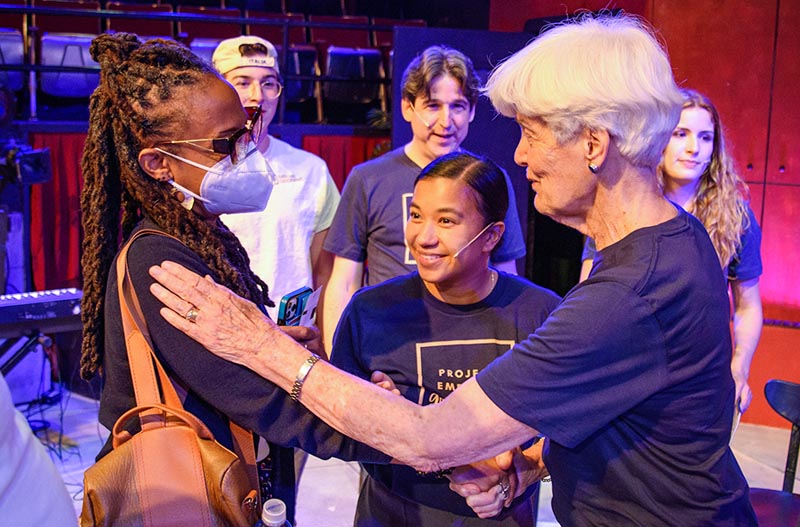

By Lindsey Lugsch-Tehle
What would it mean to experience the “Theater of the Noble”? Green Acre, a Baha’i center of learning in Eliot, Maine—is exploring this notion in collaboration with the Seacoast Repertory Theater and Artists Building Capacity as World Citizens, both of Portsmouth, New Hampshire, through an approach piloted by “Project Empathy.”
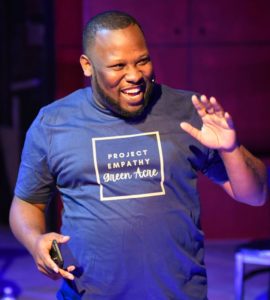
The program’s developer, Catherine Cote, connected with Najee Brown, artist-in-residence at Green Acre. Brown eagerly agreed to direct the project, and hand-selected the cast of eight from his connections in the local community to represent diverse ages, ethnicities, occupations and upbringings. With great care, Brown paired up the participants.
Over a four-week period, the cast explored their own life experiences through a series of empathy exercises, which included questions like “What is your earliest memory?” and “What is your proudest moment?”
Questions such as these provided space for the cast to write their own stories and practice telling their partner’s story in the first-person, as though each were his or her own. The team’s consultations produced a unique term for the process: Theater of the Noble.
For Tanisha Johnson, cast member and BLM Seacoast co-founder and board chair, the process was “enlightening and healing.” She says, “the group was given several rehearsals and practices and during those we did exercises to really allow us to be vulnerable, open up to each other, and examine ourselves—our stories, our reasons for being who we are, and to build a bond with each other.
“For me, I am not one to be vulnerable to those who are not a part of my inner circle, so doing this allowed me to share a part of me and allow others in. But also to know that I am not alone, that coming together like this allows for an understanding that differences in culture, beliefs, principles are not always negative but can be a positive impact to your life.”
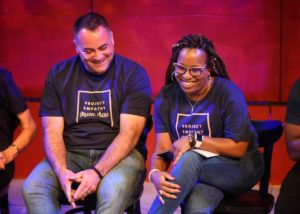

Johnson was partnered with Elliott Moya, chief of police for Eliot, Maine. Moya was reluctant at first to join, “I was prepared to tell Najee that I just wasn’t sure if this was for me. I ended up going through with it and am so happy that I did. We move through life at such a fast pace these days that we don’t often take the time to connect with people that are outside of our circle.”
Johnson says,“I was a little leery—a BLM co-founder sharing the story of a police chief? Through this process I was able to gain an understanding that I had not had before—gaining that empathy to be able to say—I may not agree with the systems and foundations of police work, but this, the human behind the uniform, is sharing honest stories about issues and trauma we all need to understand. In the end, sharing his story became a part of me.
“Writing my story and then hearing it being told was empowering and healing,” Johnson says. “I think we believe sometimes that we have healed through pain and let go when we really haven’t. So witnessing someone tell my story—at times, I couldn’t believe it was me but hearing the strength that came out of it—told by another—it changed me.”
On Aug. 3 and 4 the cast came before an audience to bare their hearts and souls. Each story was told through the owner’s words but the teller’s lens. It was called a performance, but Brown and his cast knew it to be far more than that.
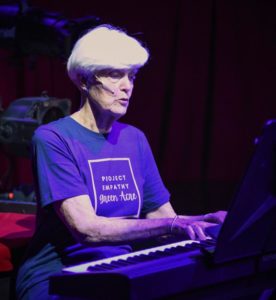

“This is not a show, not theater. This is real human reflection. An effort has to be made to go out and share,” says Joany Lincoln, musician and grandmother.
“I’ve done storytelling in my life before, but this was no longer doing a gig or performing, it was accepting,” says Anthony Bounphakhom, dancer and choreographer.
Bounphakhom says, “sharing someone else’s story was such an experience especially because I danced to it. There was a moment where my partner talks about his son, and I remember in one of the performances I held a baby boy in my arms imaginatively and in the background I actually saw Robert’s son. It made me tap into the feelings even more and made me feel not alone.”
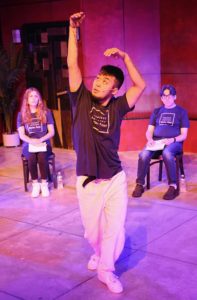

Bounphakhom’s Project Empathy partner, Robert Sapiro, director of Green Acre, recalls, “Anthony danced my story, which was really wild to see. In some ways, other people’s reaction to Anthony expressing my story struck me. On a personal level, my son was so deeply affected by my story. In it I shared things he didn’t know.”
When thinking about performing Bounphakhom’s story, Sapiro says, “It took a lot of practice going through the story again and again, retelling it and finding the nuance and expressing it. Anthony loves dance, and I have no love of dance at all! It was really interesting to go beyond telling his story and try to fall in love with something that I’m not in love with. Through the process, though, I felt it. I feel a love for it in a way through his story and through his experience.”
Joany Lincoln’s storytelling partner, Keondray Lucas, wasn’t sure they had anything in common. Lucas, a young African American actor, says, “I was afraid that we wouldn’t be a good pair because of the age [and cultural] difference … but I discovered that we probably had more things in common than not. I also wasn’t really sure if I was ready to share my story, but the way Joany presented my story was beautiful; she handled it with a level of care that I didn’t expect. I’m grateful for that.”
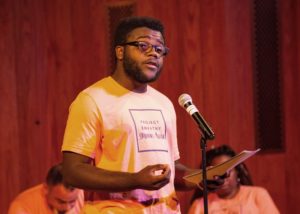

Though the project has ended, the cast continue to grow in friendship. “The growth and connections made through this experience has been nothing short of amazing,” says Moya. “While the activist and police chief pairing may seem cliché, it is deeper than that. I believe we are modeling what needs to happen, be an example of unity. People need to come together and talk, listen to one another, and while we may not always agree we can respect one another through the process and in our everyday lives,” he says.
Johnson feels the same, “I listen a bit differently; I understand with more of an open heart and mind, and I have been seen and heard now and this alone changed my life. I also found a friend—a brother—someone that will be in my life and a part of my external family.”
“The process of telling each other’s story created an understanding and a bond,” says Sapiro, adding that “Tanisha and Elliott have a genuine friendship; they hang out with each other and talk about things; they talk about policy. So we thought, let’s put them together on a podcast, which they are both thrilled and excited to do.”
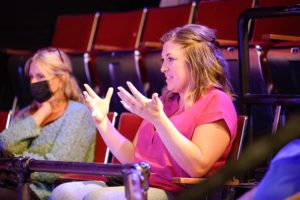

Brown’s intention from the very beginning has been to build relationships. “Relationships are the network for life,” he says. “Some people critique that we aren’t changing policy, but these relationships can contribute to longer-term change. Changing hearts is key,” Brown says. “Five years from now, if there is a problem in the community, through these relationships they can call on each other and identify ways to help each other as opposed to spreading divisiveness.”
Lincoln agrees, “this process is not an exercise in theater, or any kind of performance, but rather a real sharing—an exchange in which one can discover how much one has in common with other members of the human race, regardless of color, economic or social background, culture or country.”
For Brown, that is what the Theater of the Noble is: community coming together.
For others who want to pursue such a project visit Official Project Empathy.com.


![]()
![]()
Whether you are exploring the Bahá'í Faith or looking to become an active member, there are various ways you can connect with our community.
Please ensure that all the Required Fields* are completed before submitting.